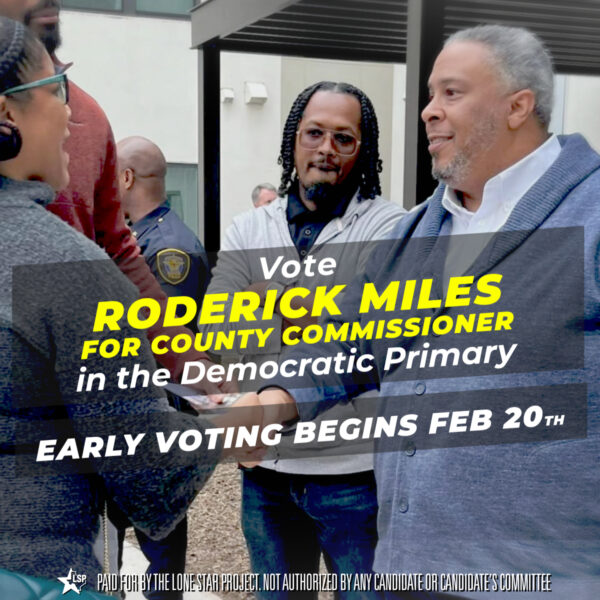Background
Texas Democratic Party officials and legal counsel became aware and concerned about this problem following the release of reports from the Lone Star Project. The reports raise questions about the legality of Texas Attorney General Greg Abbott’s use of federal grant funds to investigate and prosecute citizens who have participated in mail ballot programs that benefit seniors and the disabled. (The reports can be viewed by clicking HERE and HERE). The Lone Star Project is supporting the legal action taken today.
Summary of Claims
Plaintiffs assert that the challenged statutes enacted in Texas in 2003 violate both the U.S. Constitution and the Voting Rights Act by denying senior citizens and community activists the ability to receive and provide legally protected assistance to participate in elections and, in the case of challenged ballots, the very right to have their vote counted. The suit further asks the Court to block Texas Attorney General Greg Abbott’s current efforts to prosecute community activists and other individuals who assist senior citizens and the disabled in completing the mail ballot process and then help insure that completed ballots are mailed or delivered properly to election offices. It is a narrowly drawn complaint that seeks to correct a technical flaw in the Texas Election Code that is being exploited by Texas Attorney General Greg Abbott to selectively prosecute and suppress elderly, minority, disabled, and Democratic voters.
Voting assistance to seniors in Texas is a long established and common practice: In many Texas communities, particularly minority communities, local activists and organizations often provide direct assistance to elderly, disabled and/or homebound persons. This assistance can range from making sure their prescriptions are being filled to helping them exercise their right to vote.
“….it has been common practice by individuals, political parties and other organizations in certain communities in Texas …. to maximize voter turnout by assisting voters in casting their mail-in ballots.” (Willie Ray v. State of Texas, page 7)
2003 Statutes are not needed to stop legitimate voter fraud: Texas laws on the books prior to 2003 make it illegal to defraud voters or seek to “rig” an election. The suit filed today challenges only provisions enacted in 2003 that prohibit providing assistance to individuals to cast what otherwise would be entirely legal ballots.
“Texas law has long provided for criminal and other penalties to combat voter fraud.” (Willie Ray v. State of Texas, page 8)
“The 2003 legislation has the purpose and effect of suppressing legitimate and constitutionally protected voting activity, particularly in minority communities, as well as suppressing the legitimate, non-fraudulent expression, organization and activism of political parties and their members.” (Willie Ray v. State of Texas, page 8)
The Challenged Statutes Violate both the U.S. Constitution and the Voting Rights Act: The rights of an individual to participate in elections, have their vote counted, associate with others for political purposes and obtain assistance in voting from the person of their choice are protected by federal law. The challenged provisions deny individuals these rights.
“Most plainly, the challenged provisions violate the right of voters … to obtain and cast a mail-in ballot. Pursuant to Section 86.006(h), a ballot returned in violation of any of the restrictions of Section 86.006 “may not be counted”, thereby expressly disenfranchising voters who have received assistance allegedly in violation Section 86.006” (Willie Ray v. State of Texas, pages 18).
“Because the challenged provisions of the Texas Election Code burden and interfere with voters’ receipt of assistance from the persons of their choice by criminalizing voter assistance activity that would otherwise result in voters casting valid mail-in ballots, Section 86.006 violates Section 208 of the Voting Rights Act.” (Willie Ray v. State of Texas, page 23)
“The natural and actual consequences of the vagueness of the challenged provisions is to chill individuals’ exercise of their protected federal rights, including but not limited to their right to vote and their freedom of association.” (Willie Ray v. State of Texas, pages 22)
Abbott’s Enforcement is targeted at minority voters in violation of the Voting Rights Act: Texas Attorney General Greg Abbott is blatantly exploiting a flaw in Texas statutes to justify a phony voter fraud task force that selectively targets elderly, minority Texans who traditionally vote Democratic. All 13 cases Abbott has opened involve Democratic voters, 12 of the 13 are African American or Hispanic, and most are elderly and female. In eight of these cases, Abbott is prosecuting Texas voters for the simple act of assisting an elderly and/or disabled voter by making sure their completed and sealed ballot is placed in a mail box or delivered to an elections office. Abbott’s office has engaged in harassing actions including spying through the bathroom window of a Fort Worth senior citizen.
“….a vastly disproportionate number and percentage of those targeted for investigation and prosecution by defendants under Section 86.006 have been minority persons, namely African American or Latinos.” (Willie Ray v. State of Texas, page 24)
“….officials in the Attorney General’s office have prepared and disseminated training materials on voter fraud in Texas that make the invalid claim that a relationship exists between membership in a minority group and engaging in voter fraud activity.” (Willie Ray v. State of Texas, Page 25).
Who are the Plaintiffs?
The Texas voters challenging the statute are individuals who have assisted senior citizens complete the mail ballot process or are senior citizens who rely upon assistance to participate in elections. Several have been the targets of Abbott’s aggressive enforcement efforts.
- Willie Ray (African American, age 69) and Jamillah Johnson (African American, age 30): Ms. Ray and Ms. Johnson live in Texarkana, Texas. Ms. Ray is a respected member of the Texarkana City Council and Ms. Johnson is a local activist. Both are Democrats, and both have been prosecuted by Attorney General Abbott for assisting senior citizens participate in elections.
- Gloria Meeks (African American, age 69) and Rebecca Minneweather (African American, age 52): Ms. Meeks and Ms. Minneweather live in Fort Worth, Texas and are community and political activists who have assisted senior citizens participate in elections.
- Parthenia McDonald (African American, age 78): Ms. McDonald lives in Fort Worth, Texas. She is a homebound individual who requires assistanc e to participate in elections.
Walter Hinojosa (Hispanic, age 56): Mr. Hinojosa is a retired teacher and labor union official and local community activist who has participated in senior mail ballot assistance programs in Texas. - Texas Democratic Party: Texas Democrats encourage community and party activists to help maximize voter turnout by providing voting assistance, particularly to the elderly and disabled. They have associational rights that are protected under the United States Constitution.
Who are the Defendants?
The complaint challenges both the Texas statute and the public officials enforcing it.
- The State of Texas: The statutes challenged were enacted by the Texas State Legislature and signed by the Governor in 2003.
- Texas Attorney General Greg Abbott: Through frequent press releases issued from his official office and posted on his campaign website, Abbott has confirmed that he is aggressively enforcing the 2003 statutes in question. Abbott is being sued in his official capacity.
- Texas Secretary of State Roger Williams: As Secretary of State, Williams is responsible for ensuring that election laws in Texas receive uniform application and interpretation. Williams is also responsible for processing and resolving complaints about elections.
What is the Statute Being Challenged?
Sections 64.036(a)(4), 84.003(b), 84.004, 86.0051, and 86.006 of the Texas Election Code were enacted in 2003. No provision enacted prior to 2003 is being challenged.



